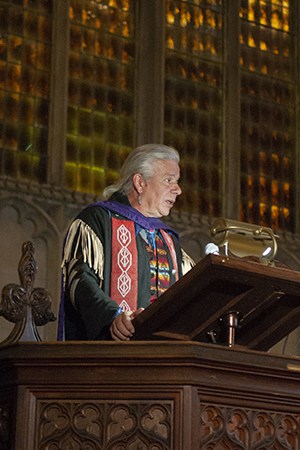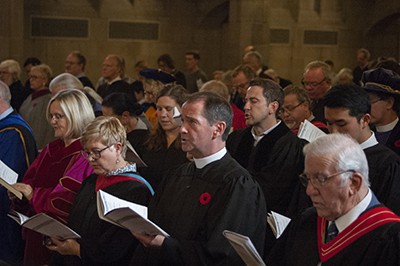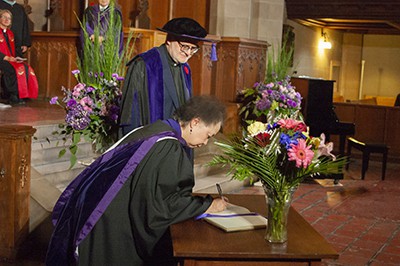Knox celebrates 175 years at Founding Day Convocation
 On November 5, 2019, Knox College held a special Founding Day Convocation service to celebrate the 175th anniversary of the first Knox College classes, which were held on November 5, 1844.
On November 5, 2019, Knox College held a special Founding Day Convocation service to celebrate the 175th anniversary of the first Knox College classes, which were held on November 5, 1844.
At the service, Knox College granted the degree Doctor of Divinity (honoris causa) to three people: the Rev. Dr. Terry LeBlanc, Dr. Stephanie Ling, and the Rev. Dr. Pearce J. Carefoote. Learn more about the three degree recipients here. Knox College presented Distinguished Leadership Awards to two people: Ms. Beverly Grace LeBlanc and Dr. Peter N. Ross. Learn more about the two award recipients here.
The Board of Governors, on the recommendation of the Principal, Faculty, and Academic Committee, was also pleased to recognize the Rev. Dr. J. Dorcas Gordon’s long-standing and continuing association with Knox College, and her distinguished leadership in theological education, with the status of Principal Emerita. For eighteen years, 1999–2017, Dr. Gordon served with distinction as Principal of Knox College.
 Dave Lee, president of the Knox College Mission and Theology Society, led the group in a Litany of Thanksgiving and Intercession, praying: “We give thanks for your faithfulness to generations of teachers and scholars, students and residents, staff and administrators. . . . Help us to be a community of welcome, friendship, hospitality, and inclusion, where faith, hope, and love prevail.”
Dave Lee, president of the Knox College Mission and Theology Society, led the group in a Litany of Thanksgiving and Intercession, praying: “We give thanks for your faithfulness to generations of teachers and scholars, students and residents, staff and administrators. . . . Help us to be a community of welcome, friendship, hospitality, and inclusion, where faith, hope, and love prevail.”
The Rev. Dr. Terry LeBlanc presented the Convocation Address,“What Goes Around: Circular Theology in a Linear Age.” In it, he contrasted Western theology’s linear understanding of history and theology with a cyclical or circular understanding, such as that which is foundational to indigenous thinking. Following are excerpts from LeBlanc’s address. Watch the address, or the service in its entirety, at https://www.youtube.com/watch?v=n9URhmgroGc on Knox’s YouTube page. Find additional photos from the event here on Knox’s Facebook page.

Christian theology’s focus on an unknown and unknowable future has arguably driven Western society toward a despair of its mission and its existence, and an apocalypse to some extent of its own making.
The unwavering, unyielding line of history that moves inexorably onward from past through present to a future that is unknown creates errors in understanding of the church’s theology that are dealt with in largely the same way throughout each of its periods of history. The thinking that we just need to implement the things that we’ve done in the past more vigorously is pursued time and again.
It’s my hope that a removal of our trajectory as linear peoples toward a linear future, and an insertion of a cyclical view, might be helpful to us, both theologically and relationally.
A circular theology informed by indigenous cultures would be less likely to be destination-centred, as it would be journey-oriented.
Thinking in a circular way suggests that integrity with respect to the gospel and our faith would mean, at the very least, that life is to be navigated with our face toward the past, and our backs toward the future.
In such a way of thinking, we are therefore here in the present moment not because of a desired future that mysteriously draws us forward, but because of a relatively knowable past that pushes or propels us into and then defines the parameters of the present.
An indigenous circular view sees all things in cyclical fashion to be restored, renewed, revitalized, and to be observed in the circle as they were intended to be. What went around will indeed come around again. Our decision is, what do we want to come around again? Do we want the same experiences that the church has been through in the past hundreds of years? Or would we look for something new?
